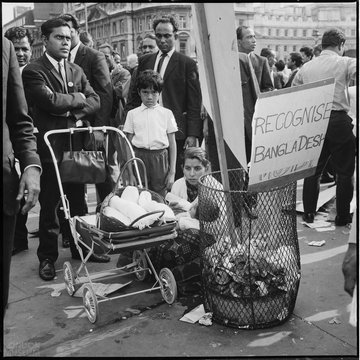
Bangladesh Liberation Movement
‐
British Bengali communities united in a joint effort to galvanize support for an independent Bangladesh in 1971
About
The Bangladesh Liberation Movement in Britain was triggered by rising tensions between West and East Pakistan. In 1970 Cyclone Bhola killed around 300,000 people in East Pakistan, and West Pakistan did not intervene. Further injustices such as labour exploitation, unfair distribution of resources and the suppression of the Bengali language triggered widespread outrage among Bengalis in East Pakistan and the diaspora. The Bangladesh Liberation Movement was formed in response.
On 5 March 1971 over 1,000 Bengalis marched through Hyde Park to the Pakistan High Commission building. Vigils were organized and the Pakistan flag was pulled down from the High Commission building and burnt by activists. A few days later, on 7 March, over 10,000 Bengalis marched in Hyde Park following a speech by Sheikh Mujibur Rahman – a key figurehead of Bangladesh’s grass-roots activism. Bangladeshis named 23 March 'Resistance Day', during which activists displayed the Bangladeshi flag across public spaces in open defiance of an oppressive West Pakistani government. Birmingham’s East Pakistan Liberation Front followed a similar policy of direct action. Roughly 3,000 people marched in Smallheath Park, and some engaged in violence towards West Pakistanis. It was here that West Pakistanis retaliated and stabbed a Bengali. In Tower Hamlets, attacks were organized on West Pakistani-owned shops. Prayers alongside West Pakistanis in East London Mosque were also boycotted by Bangladeshis.
Anowara Jahan, founding member of Bangladesh Women's Association, galvanized grass-roots activism among Bengali women. They organized a mela on 7 March, which raised £700, and a march in Hyde Park on 3 April, which was attended by 300 people. The BWA worked directly with resistance groups in Bangladesh, exchanging letters and updating communities on the situation in East Pakistan. Member Kulsum Ullah stood outside Pakistani shops shouting at passers-by to boycott them. The BWA also organized public speeches at Trafalgar Square. Female members from Action Bangladesh liaised with Bengali diplomats.
A UK branch of the Awami League was established. It was led by Justice Chowdhury and sympathetic Labour MPs Donald Chesworth and John Stonehouse. They managed the Bangladesh Fund, which raised over £400,000. The Awami League took weekly donations and used some donations to book coaches taking Bengalis from Bradford to join demonstrations in London. Peter Shore, Labour MP for Stepney between 1964 and 1974 and, later, Stepney and Poplar between 1974 and 1983, was involved with the Awami League as part of his long-standing support for the cause of Bangladeshi liberation. Shore also founded the British Bangladesh Society in 1973 to foster stronger relationships between British and Bengali people.
The movement for Bangladeshi liberation culminated in a war of independence, which began on 26 March 1971 after West Pakistan initiated Operation Spotlight on 25 March 1971. The operation, which aimed to curb Bengali nationalism, initiated a genocide in which up to 3 million Bengalis were killed. Some members of the Bengali diaspora in Britain decided to return to the subcontinent to fight in the war. For example, Dr Zafrullah Chowdhury, who migrated to Britain for his postgraduate studies in 1974, co-founded the Bangladesh Medical Association with Dr Sayedur Rahman in London, two weeks after the outbreak of war. Chowdhury went back to Bangladesh on behalf of the organization to arrange adequate medical aid for the war wounded. In addition, on 27 November 1971, 1,000 Bengalis met in east London and the majority volunteered to enlist in the war. Similarly sized meetings also took place at East Pakistan House a few days later, with the purpose of creating a central organization for Bengalis in Britain to advocate for the recognition of Bangladesh as a nation state.
In December 1971 protesters marched through Birmingham in support of Bangladesh, which was filmed by ATV. The protesters – many of whom carried placards with Sheikh Mujibur Rahman’s image – included men, women and children. The journalist Greg Barnes interviewed those who enlisted to fight in the war, with interviewees expressing their commitment to independence, particularly in light of the atrocities perpetrated against Bengalis by the Pakistani forces.
On 16 December 1971 the Bangladesh Liberation War ended after Pakistani forces surrendered to Indian and Bangladeshi troops.
Awami League, Bangladesh Women Association, Birmingham East Pakistan Liberation Front.
Jebunnessa Baksh, Lulu Bilkis Bani, Donald Chesworth, Justice Chowdhury, Shefali Huq, Anowara Jahan, David Lane, Bashir Maan, Ferdaus Rahman, Sheikh Mujibur Rahman, Munni Rahman, Pranlal Sheth, John Stonehouse, Peter Tucker, Khaleda Uddin, Kulsum Ullah.
Choudhury, Yousuf, The Roots and Tales of the Bangladeshi Settlers (Birmingham: Sylheti Social History Group, 1993)
Eade, John, The Politics of Community: The Bangladeshi Community in East London (Aldershot: Avebury, 1996)
Eade, John and Garbin, David, ‘Competing Visions of Identity and Space: Bangladeshi Muslims in Britain’, Contemporary South Asia 15.2 (2006), pp. 181–93
Glynn, Sarah, Class, Ethnicity and Religion in the Bengali East End: A Political History (Manchester: Manchester University Press, 2015)
Payne, Daniel, 'Peter Shore & Bangladesh in the LSE Library Archives', LSE (20 December 2021), https://blogs.lse.ac.uk/lsehistory/2024/04/17/peter-shore-and-bangladesh-in-the-lse-library-archives/
Ranjan, Amit, ‘Bangladesh Liberation War of 1971: Narratives, Impacts and the Actors’, India Quarterly 72.2 (June 2016), pp. 132–45
GB3228 19/4/2, 'From Battle Front to Community: Story of Gonoshasthya Kendra’ published by Gonoshasthya Kendra Trust, Ahmed Iqbal Ullah RACE Centre Collections, Manchester Central Library, Manchester
Ali, Tariq, ‘The New Vietnam?’, Daily Mirror (31 March 1971)
‘Bengal Anger in London’, Guardian (29 November 1971)
ATV Today, ‘Protest outside Edgbaston cricket ground’ (3 March 1971), Media Archive for Central England, https://www.macearchive.org/films/atv-today-03061971-protest-outside-edgbaston-cricket-ground
ATV Today, ‘Bangladesh supporters stage protest march, Birmingham’ (6 December 1971), Media Archive for Central England, https://www.macearchive.org/films/atv-today-06121971-bangladesh-supporters-stage-protest-march-birmingham
For image and copyright details, please click "More Information" in the Viewer.
Image credit
A Bengali family demonstrate for Bangladesh's independence, Trafalgar Square, by Henry Grant, HG2643/14 © Henry Grant Collection/London Museum, https://creativecommons.org/licenses/by-nc/4.0/
Entry credit
Nazma Ali
